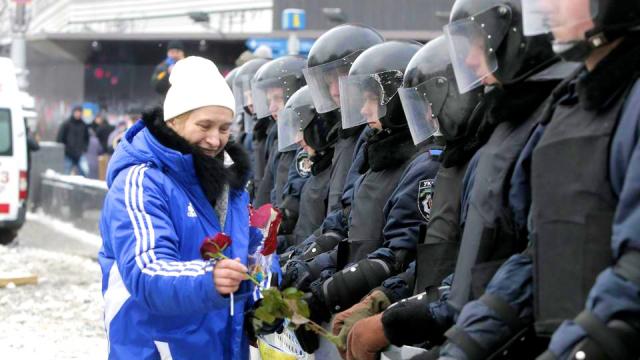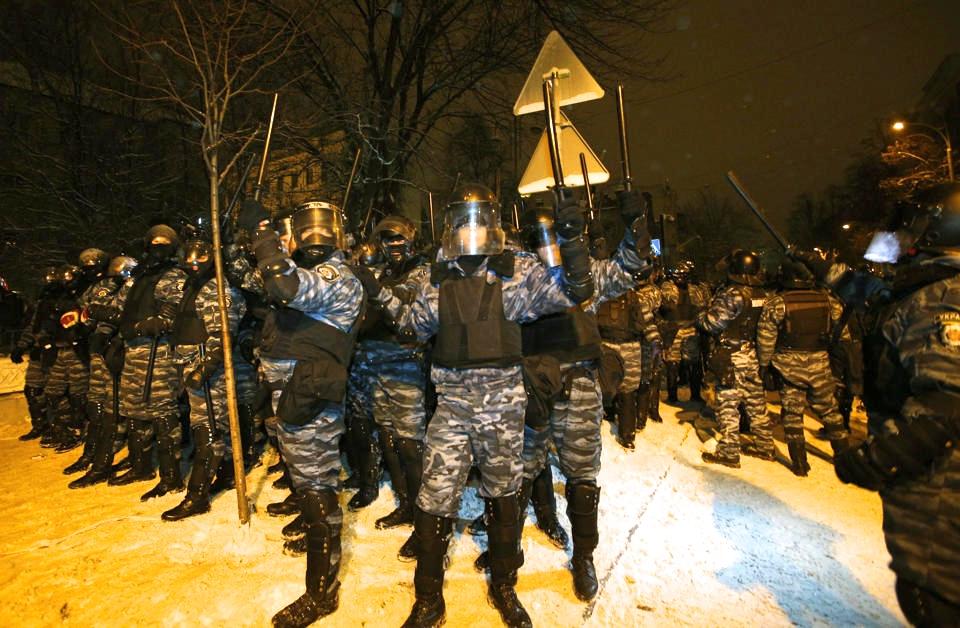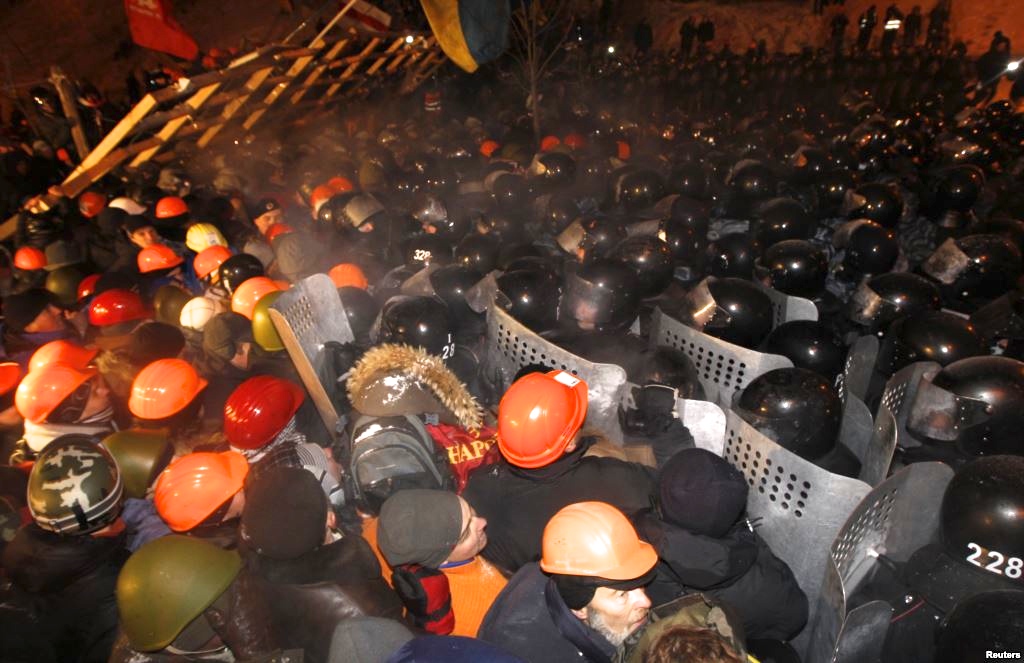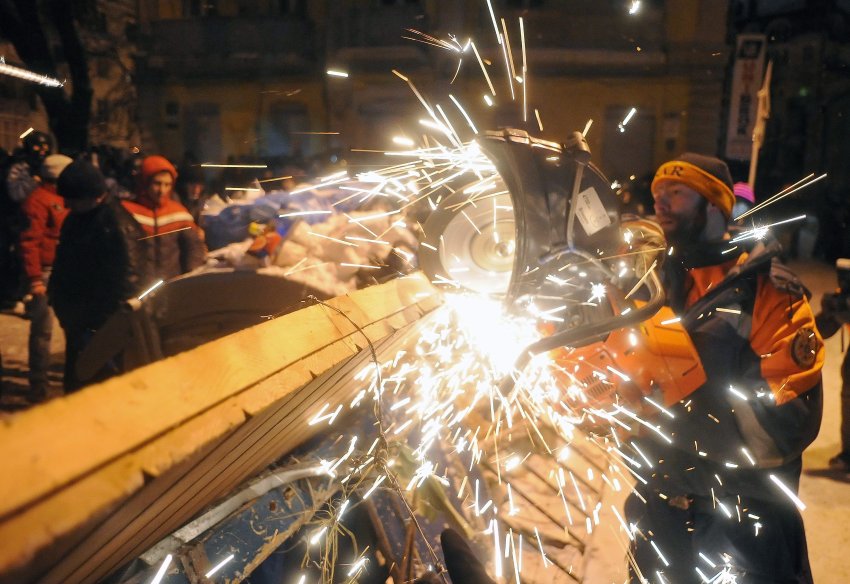
Thousands of riot police carried out a co-ordinated attack on barricades in Kiev during the dead of night on Wednesday – a determined and unexpected crackdown on protesters who have occupied the centre of Ukraine's capital for the past fortnight.
As temperatures fell to -13C (9F) during the coldest night of the winter to date, columns of riot police closed in on Independence Square, hub of the protests that erupted after President Viktor Yanukovych pulled out of an association pact with the E.U. that had been due for signing at a summit in Vilnius last month. Shortly after 1am battalions of police approached the vast square from all sides and began to dismantle the makeshift barricades that have been erected in recent days.
Ukraine's prime minister, Mykola Azarov, said later on Wednesday the operation by police was a question of clearing the roads. "No force will be applied against peaceful protesters. Do you understand this? Calm down!" he said as he opened a government meeting.
Police pulled out of the square on Wednesday morning, even as more protesters arrived. America's deputy secretary of state, Victoria Nuland, visited the square and handed out biscuits to protesters.
Several police officers confirmed they had been given orders to clear barricades from the boundaries of the square but not remove the tent camp that has sprung up inside the space.
The fiercest battle came on the north side of the square, where hundreds of black-helmeted riot police struggled for several hours against lines of protesters wearing orange helmets distributed by organisers, in scenes that threatened to descend into all-out pitched battle.
Many police were trapped behind protester lines during the scuffles but the demonstrators set them free and even handed back their shields, only for police to launch new assaults. Eventually chainsaws were used to clear the barbed wire topped wooden barriers and hundreds of riot police moved into the square itself.
A priest brandishing a cross walked towards the lines of police but was pushed back as protest leaders announced from the main stage that it was a peaceful protest and called for a stop to the crackdown. As the mobilisation continued a religious service was held on the stage with hundreds of protesters chanting: "Tomorrow there will be a million of us."
The protests, which began when Yanukovych abandoned the pact with the E.U., culminated on Sunday with the biggest demonstration since the 2004 Orange Revolution, with hundreds of thousands of people paralysing the centre of Kiev and the city's statue of Vladimir Lenin toppled and hacked to pieces.
The dwindling appetite for protest was given fresh impetus by a brutal crackdown on a relatively small protest a fortnight ago. Few had expected a repeat from the authorities, especially after a day of diplomacy.
Earlier on Tuesday Yanukovych had stated at a round table with Ukraine's three previous presidents that he would try to sign the deal with the E.U. by spring – ignoring financial pressure from Russia – as long as Europe gave Ukraine better financial conditions.
 "We tasked the government to accelerate this work and involve as many specialists as needed," said Yanukovych during the televised meeting. "When is the next summit? If it takes place in March then we have to finish this work by March. But it will depend not only on us; it will also depend on the European commission. This is our goal."
"We tasked the government to accelerate this work and involve as many specialists as needed," said Yanukovych during the televised meeting. "When is the next summit? If it takes place in March then we have to finish this work by March. But it will depend not only on us; it will also depend on the European commission. This is our goal."
Russia is believed to have offered cash-strapped Ukraine financial support and reduced gas prices, while threatening the country with financial woe if it goes ahead and signs the agreement. "We want to achieve conditions that satisfy Ukraine, Ukrainian producers, the Ukrainian people," said Yanukovych.
Later he met for three hours with Catherine Ashton, the E.U.'s top foreign representative, who told Yanukovych he should not use force. Later she visited Independence Square and was escorted through the crowds by Arseniy Yatsenyuk, of jailed former prime minister Yulia Tymoshenko's party, in surreal scenes as the crowd chanted her name.
Ashton remains in Kiev but this did not stop Yanukovych launching an assault on the square. During the night Ashton said: "I observe with sadness that police use force to remove peaceful people."
The US secretary of state, John Kerry, released a strongly worded statement on the events of the night: "The United States expresses its disgust with the decision of Ukrainian authorities to meet the peaceful protest in Kiev's Maidan Square with riot police, bulldozers and batons, rather than with respect for democratic rights and human dignity. This response is neither acceptable nor does it befit a democracy."
In Kiev city hall, which has been occupied by protesters for 10 days and declared the centre of revolutionary self-government, protesters had seen riot police dismantle tents outside but not attempt to storm the building. A group of men outside were spraying the street with water from a fire hose in order to create a frozen ice rink that would be too slippery for riot police to attack from.
Mid-morning on Wednesday busloads of riot police approached the town hall and parked outside, but eventually drove off, to much triumphant singing from the protesters.
Arkady, a 19-year-old student, said he had heard about the police attack on the radio at 3am and decided to come out. "It's a bit scary but we have to be here," he said, hugging his girlfriend. "We need to get rid of the president and have fresh elections."
As dawn broke on the square on Wednesday prayers and pop songs were played from the stage and several thousand people were still in place. Opposition leaders called for a huge protest against the police action during the day. With Independence Square now largely cleared of barricades it is unclear who will hold the initiative.
An exhausted Vitali Klitschko, the heavyweight boxer who has become one of the key leaders of the protests, said he was amazed by the police movements and was heading back to Independence Square despite not having slept.
"This was the most stupid thing the authorities could have done," said Klitschko. "To clear out the square when Catherine Ashton is in town. People here are determined not to live in a police state."
Klitschko said he planned to meet Ashton during the day and put his concerns to her about protesters injured and arrested during the police action. There were no figures on injuries but Klitschko said several protesters had been hurt, while police said at least 10 of their officers had suffered serious injuries in the scuffles.
3 WAYS TO SHOW YOUR SUPPORT
- Log in to post comments













